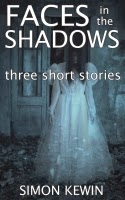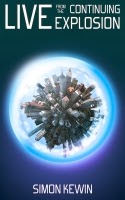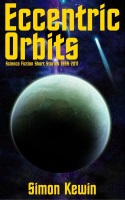So, an interesting talk about SF at the Cheltenham Literary Festival last week. The panel members were Michael Moorcock, Iain M. Banks, Gwyneth Jones and China Miéville. I have to be honest and admit I mainly only went to see and hear Moorcock, who is a bit of a hero. But of course all the panel members were fascinating.
Moorcock played the avuncular elder-statesman role. Banks was as witty as ever; if the SF ever dries up I'm sure he could cut it as a stand-up. Jones frankly looked a bit mystified to be there and Miéville was a one-man lecture on the sociological aspects of SF. At various points, each of the other writers, stumped by some question, said "I'm sure China will be able to answer that." Smart guy. I've started reading his books ...
The main discussion centred on the differences between British and American SF. I must admit, I'd never really categorized science fiction into those terms but I could see what they meant. So, American SF tends to be both more militaristic and more individualistic. British SF ("chocolate biscuit SF") tends to be more about communities than individuals. Or does it? I keep thinking about exceptions to such simplistic rules. American SF has tended to be polarized between the social-democratic left and the individualist right. British SF is generally just of the liberal left. Again, I can see what they mean, but again, it's surely more complex than that. I don't know, what do you think?
Anyway, thought-provoking stuff and a good turn-out. I'm thinking about tackling a pure SF novel next and I could certainly see how it might fit into a conception of "British SF" ...
skip to main |
skip to sidebar

Simon Kewin

-
Simon is a fantasy/SF writer, the author of over 100 published short stories, quite a lot of poetry and the novels The Genehunter, Engn and the Cloven Land fantasy trilogy.
His short stories have appeared in Nature, Analog, Daily Science Fiction, BFS Horizons, Abyss & Apex and many more.
He's a member of the British Fantasy Society and Untethered Realms.
He's signed to Curiosity Quills Press for the publication of his Engn books and is also an indie author (through Stormcrow Books).
Books

Hedge Witch urban/high fantasy (Cloven Land #1) |
||
| Amazon | Kobo | Google | Nook | Apple | Buy Direct | ||

Wyrm Lord urban/high fantasy (Cloven Land #2) |
||
| Amazon | Kobo | Google | Nook | Apple | Buy Direct | ||

Witch King urban/high fantasy (Cloven Land #3) |
||
| Amazon | Kobo | Google | Nook | Apple | Buy Direct | ||

Hyrn urban/high fantasy (Cloven Land #0) |
||
| Amazon | Kobo | Google | Nook | Apple | Free Download | ||

The Cloven Land Trilogy The complete box set |
||
| Amazon | Kobo | Google | Nook | Apple | Buy Direct | ||

The Genehunter dystopian sci/fi detective thriller |
||
| Amazon | Kobo | Google | Nook | Apple | Buy Direct | ||

Engn "a steampunk Gormenghast" |
||
| Amazon | Curiosity Quills Press | ||

Other Worlds fantasy and sci/fi short stories |
||
| Amazon | Kobo | Google | Nook | Apple | Buy Direct | ||

Witching Hour three fantasy short stories Amazon | Kobo | Google | Nook Apple | Buy Direct |

Faces In The Shadows three ghostly short stories Amazon | Kobo | Google | Nook Apple | Buy Direct |

Remembrance Day a Möbius Station short story Amazon | Kobo | Google | Nook Apple | Buy Direct |

The Armageddon Machine a science fiction novella Amazon | Kobo | Google | Nook Apple | Free Download |

Malware a technothriller short story Amazon | Kobo | Google | Nook Apple | Buy Direct |

We, The People Of The Clouds a future Earth novella Amazon | Kobo | Google | Nook Apple | Buy Direct |

Guitar Heroes a fantasy short story Amazon | Kobo | Google | Nook Apple | Free Download |

Museum Beetles a fantasy short story Amazon | Kobo | Google | Nook Apple | Buy Direct |

Seek Alternative Route a short story Amazon | Kobo | Google | Nook Apple | Buy Direct |

Live from the Continuing Explosion a science fiction short story Amazon | Kobo | Google | Nook Apple | Free Download |

Slay Ride a Christmas Miscellany Amazon | Kobo | Google | Nook Apple | Free Download |

The Clockwork King a fantasy novella Amazon | Kobo | Nook | Google Apple | Buy Direct |

Spell Circles fantasy short stories 1999-2011 Amazon | Kobo | Nook | Google Apple | Buy Direct |

Eccentric Orbits sci/fi short stories 1999-2011 Amazon | Kobo | Nook | Google Apple | Buy Direct |

Life Cycles literary short stories 1999-2011 Amazon | Kobo | Nook | Google Apple | Buy Direct |

Perfect Circles collected short stories 1999-2011 Amazon | Kobo | Nook | Google Apple | Buy Direct |
The Publishometer
323 works + 69 reprints = 392 publications:
Full list of published books, stories and poems
| Box sets | 1 | |
| Novels | 5 | + 1 reprint |
| Short story collections | 8 | |
| Novellas/novelettes | 12 | + 6 reprints |
| Short Stories | 65 | + 36 reprints |
| Flash stories | 57 | + 16 reprints |
| Micro stories | 87 | |
| Poems | 76 | + 10 reprints |
| Audiobooks/Podcasts | 12 |
Copyright © Simon Kewin.






"Jones frankly looked a bit mystified" - lol!! That was just funny! :-)
ReplyDeleteI've never thought there was a difference between US SF and British (European?) SF but now that it's put this way (between ideologies) maybe there is. Then again you could say there is are differences between women/black/asian/male etc SF writers too?
Gosh this is deep!! :-)
Take care
x
I haven't thought of it in that way either. While of course there has always been "rugged invidiualism" in American fiction, regardless of genre, it seems to have taken a backseat to "the good of the many" in more recent Sci-Fi.
ReplyDeleteOld Kitty,
ReplyDeleteYes, I'm sure you could say that. There was some discussion of European vs. British vs. English vs. Scottish SF last week. I think these are broad generalizations - but, on the other hand, could you imagine, say, Dr. Who being made in the USA? It just is British SF isn't it?
Milo,
ReplyDeleteFair point. To be honest, they were mainly singling out Heinlein on the "rugged individualist" wing. But yeah, the needs of the many outweighing the needs of the few and all that ...
I never really thought about SF that way, either. I can see how it would be different though; the cultures aren't the same, so that would be reflected in the writing.
ReplyDeleteGolden Eagle,
ReplyDeleteFair point - although maybe there are more similarities than differences? Increasingly?
I find it fascinating that they view US SF as "militaristic AND individualistic" --an insane paradox that reflects the US culture at large. Right now the screaming irrational rhetoric that promises "rugged individualism" in the US is really implementing a Militaristic neo-Fascist takeover. It's like living in a SF novel in the US right now. (As I watched a Dr. Who marathon last night, I kept seeing parallels between The Master and Karl Rove.)
ReplyDeleteAs goes our SciFi, so goes our culture...
Give me Brit "chocolate biscuit" liberalism any day.
Anne,
ReplyDeleteAs a Brit I didn't feel I was qualified to say all that : but yes, that's rather how it looks from across the Atlantic to me too. Scary.
Fascinating stuff. I loved your description of each writer, lol.
ReplyDeleteSimon, all your fears are justified, and then some. I have a terrible feeling that all Americans with IQs larger than their funny-hat size may soon be running screaming for the borders. Margaret Atwood's Handmaid's Tale won't be SF anymore.
ReplyDeleteOf course there are differences between Brit and U.S. SF. Two different cultures. I took a university course once that focused on the differences and how these differences affected the reader/audience. British comedy, for example, uses a lot more doors with characters in and out. Here, the comedic tends to be locale centered with limited motion.
ReplyDeleteThere's nothing wrong with these differenes. Just think how boring the world would be if we were all the same.
That sounds like an interesting discussion. I never thought about the difference between american and british SF..or even if there was a difference. But it kinda makes sense.
ReplyDeleteLyn
W.I.P. It: A Writer's Journey
Anne,
ReplyDeleteWell, let's just hope the intelligent and thoughtful prevail. I see the Tea Party look like they will do well in the mid-term elections? There are more like Sarah Palin?!
Kittie,
ReplyDeleteThat does sound fascinating. Now I'm replaying scenes from my favourite US and UK comedies in my head!
Of course, there are differences between our cultures, although I tend to think, because we are so immersed in our own cultures and so familiar with the subtleties and nuances, that we tend to focus on the (often quite small) differences rathr than the big, familiar similarities.
I'm not into military stuff, so if it has that theme I generally don't read it. I guess it's time for you to shake things up Simon.
ReplyDeleteNancy
N. R. Williams, fantasy author
N. R.
ReplyDeleteI can only try!